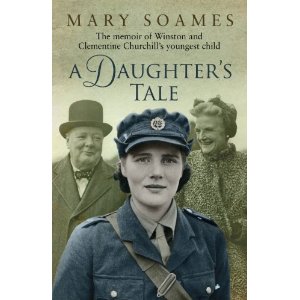
Churchill in the News
Book Review in The Spectator: “A Daughter’s Tale”

October 12, 2011
At home in the corridors of power
By Philip Ziegler
A Daughter’s Tale: The Memoir of Winston and Clementine Churchill’s Youngest Child, By Mary Soames
Doubleday, 402pp, £25
THE SPECTATOR, 24 September 2011—To be the daughter of an enormously powerful man must always be an enthralling if sometimes daunting experience. To be close to that father when, almost single-handed, he is shaping the destinies of the nation, if not the world, is to be uniquely privileged. Mary Soames took no part in the decision-making that was happening above her head, but she was singularly well placed to sense what was going on and to understand the man who was riding the storm with such courage and aplomb.
She was much younger than her siblings, her father was absorbed in his Herculean task, her mother knew that her first responsibility must be to her husband. Mary Soames was therefore a solitary child, but she never felt neglected and was incapable of self-pity.
She spent a happy youth in the family home of Chartwell, broken by sojourns in Admiralty House and No. 11 Downing Street, where she distinguished herself by pouring water over the policeman on duty outside the door (a wholly uncharacteristic piece of mischief in a life marked throughout by generosity and consideration for others). She was present at the critical debate when Neville Chamberlain was hounded from office and the way cleared for Winston Churchill to take the lead. From then on she was near the heart of everything:

2024 International Churchill Conference
It was now that my love and admiration for my father became enhanced by an increasing element of hero-worship. I saw how people turned to him in confident hope; and my own daughterly affection became entwined with all the emotions I felt as a young, patriotic Englishwoman.
As a young, patriotic Englishwoman she felt it her duty to join the ATS — the Auxiliary Territorial Service – as soon as her age allowed it. She had some qualms — her mother was carrying an immense burden and she knew that her assistance was invaluable — but in the last resort she was certain where her duty lay. ‘If I really feel as ardently about the war as I think I do,’ she wrote in her diary, ‘then surely I must give more.’
She could never wholly escape from being Churchill’s daughter. ‘Please write to me in plain envelopes without the Downing Street address and address me as Private M. Churchill’ she urged her mother. But the cat was soon out of the bag — the fact that the Prime Minister’s daughter was serving in the ranks was too good a piece of propaganda for the authorities not to exploit. Her life became one of bewildering contrasts — from square-bashing or cleaning the barrack room floor to a luncheon party at Chequers where she stood in for her mother and found herself hob-nobbing with Mountbatten and Alan Brooke. As an officer her battery was part of the defences on the North Downs which tried to shoot down the V1s before they could reach London. Many other girls had the same experience, but few others, while at work, were visited by the Prime Minister, eager to observe and, if possible, to join in the action.
In 1945 she went as her father’s ADC to the Potsdam Conference. It was Churchill’s first real meeting with President Truman. ‘He told me he liked the President immensely’, she wrote to her mother, ‘they talk the same language. He says he is sure he can work with him. I nearly wept for joy and thankfulness.’
But they were not to work together for long. On 25 July the Prime Minister flew back to London to await the results of the General Election. Mary had been distressed to find that her father, so recently everybody’s hero, had suddenly become a target for violent abuse. ‘I hate these scathing, unjust, untrue attacks on Papa. Wow — oh wow — I wish I could talk to you about it. Miserable Kitten with electionitis…’
She had been strikingly prescient about the national mood: ‘I think you will find the Army votes will largely go to Labour. You must remember the Daily Mirror is widely read by all Ranks and especially the Other Ranks.’ But she still had not anticipated the electoral avalanche which swept her father from power. His defeat was total and overwhelming : ‘But not for one moment in this awful day did Papa flinch or waver. “It is the will of the people” — robust — controlled.’
Diary entries like this and letters to her mother are at the heart of this book. Perceptive, funny, always totally honest, it provides an unequalled view of the corridors of power. Mary was neither downstairs nor upstairs: her view was from the nursery, the schoolroom, that of the family member who took no part in the shaping of great events but saw and noted almost everything. It is not the whole story, but it is a vital part of it and one which could not come from any other source.
Subscribe
WANT MORE?
Get the Churchill Bulletin delivered to your inbox once a month.


